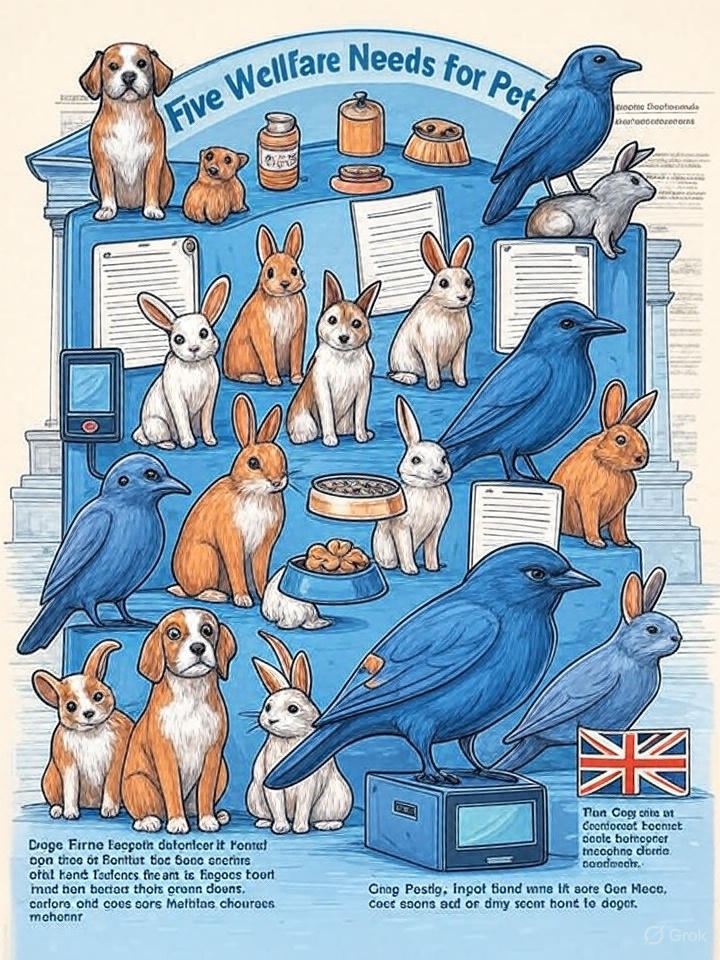Last updated: July 2025 | Published on Pocket Pets Heaven
Understanding UK pet laws is crucial for every pet owner, whether you’re considering adopting a traditional companion or exploring exotic pets UK regulations. From microchipping requirements to licensing exotic animals, this comprehensive guide covers everything you need to know about legal pets UK legislation in 2025.
What Pets Are Legal in the UK? Essential Overview
The question “what pets are legal in the UK” doesn’t have a simple answer. Unlike many countries, the UK operates on a complex system of regulations rather than a straightforward banned list. According to recent government statistics cited by GOV.UK, over 51% of UK households own pets, making understanding these laws more important than ever.
Common Legal Pets (No License Required)
- Dogs and cats
- Rabbits, guinea pigs, and hamsters
- Most birds (except protected species)
- Fish (non-invasive species)
- Reptiles (with exceptions)
Pets Requiring Special Licensing
The Dangerous Wild Animals Act 1976 governs exotic pet ownership, requiring licenses for animals including:
- Wild cats (servals, ocelots)
- Primates (monkeys, lemurs)
- Large birds of prey
- Venomous snakes
- Some marsupials
Key UK Pet Legislation: Understanding Your Legal Framework
Animal Welfare Act 2006: The Foundation

The Animal Welfare Act 2006 serves as the cornerstone of pet protection in the UK. This legislation, frequently referenced by animal welfare organizations like the RSPCA, establishes the “five welfare needs” that every pet owner must meet:
- Need for a suitable environment
- Need for a suitable diet
- Need to exhibit normal behavior patterns
- Need to be housed with or apart from other animals
- Need to be protected from pain, suffering, injury, and disease
Failure to meet these needs can result in fines up to £20,000 or six months imprisonment, as reported by legal experts on Wikipedia’s Animal Welfare Act page.
Dangerous Wild Animals Act 1976: Exotic Pet Licensing
For those interested in exotic pets UK, the Dangerous Wild Animals Act 1976 requires licensing for over 30 species categories. The licensing process, detailed by local councils across the UK, involves:
- Veterinary inspection of facilities
- Insurance requirements (minimum £1 million)
- Annual license fees (£200-£500 depending on council)
- Regular compliance checks
Consumer Rights Act 2015: Pet Purchase Protection
The Consumer Rights Act 2015 provides crucial pet purchase protection Consumer Rights Act 2015 coverage. When buying from commercial sellers, pets must be:
- As described
- Of satisfactory quality
- Fit for purpose
This legislation, highlighted in consumer guides by Which?, gives buyers significant rights if pets have undisclosed health issues.
Microchipping Laws: Legal Requirements for UK Pet Owners
Microchipping UK laws have evolved significantly. Since April 2016, all dogs over 8 weeks must be microchipped. The microchipping puppies UK legal requirement includes:
Current Microchipping Requirements
- Dogs: Mandatory from 8 weeks old
- Cats: Mandatory from June 2024 (phased implementation)
- Ferrets: Recommended but not legally required
- Rabbits: No legal requirement but strongly advised
Failure to comply with microchipping laws can result in fines up to £500. The Kennel Club provides detailed guidance on compliance procedures.
Age Restrictions: How Old to Buy a Pet in the UK
The question “how old to buy a pet in the UK” has a clear answer: you must be 16 years old to purchase a pet independently. However, responsibilities under Animal Welfare Act UK extend beyond age requirements:
- Under 16: Cannot purchase pets without guardian consent
- 16-18: Can buy pets but parents remain legally responsible
- 18+: Full legal responsibility for pet welfare
Dog-Specific Legal Obligations
Dangerous Dogs Act and Breed-Specific Legislation
The Dangerous Dogs Act breed-specific legislation UK remains controversial. Banned breeds include:
- Pit Bull Terrier
- Japanese Tosa
- Dogo Argentino
- Fila Brasileiro
However, as noted by animal law experts featured in The Guardian and BBC News, the focus has shifted toward individual dog behavior rather than breed-specific bans.
Livestock Worrying and Public Control
Dog laws around livestock worrying UK are particularly strict. The offense, defined as attacking or chasing livestock, can result in:
- Unlimited fines
- Compensation claims from farmers
- Possible destruction orders
Lost stray dog legal requirements UK mandate that found dogs must be reported to local authorities within 24 hours.
Lucy’s Law: Revolutionary Puppy and Kitten Sales Protection
Lucy’s Law puppy kitten sale restrictions England transformed pet sales in 2019. Named after a Cavalier King Charles Spaniel rescued from a puppy farm, this legislation prohibits:
- Third-party sales of puppies and kittens under 6 months
- Sales away from the breeding premises
- Commercial sales without proper licensing
The law, championed by campaigns featured in Forbes articles about animal welfare, significantly reduced puppy farming operations.
Exotic Pet Licensing: Navigating the Complex System
The “Negative-List” Gap in UK Pet Law
Unlike some European countries, the UK doesn’t operate a comprehensive negative-list system UK pet law. This creates grey areas for exotic pet ownership. The current system focuses on “dangerous” animals rather than comprehensive exotic pet regulation.
Popular Exotic Pets Requiring Licenses
Wild cats primates pigs marsupials UK legal as pets status varies significantly:
Wild Cats
- Serval cats: License required
- Savannah cats (F1-F4): Often require licensing
- Scottish Wildcats: Protected species, illegal to own
Primates
- All primates require Dangerous Wild Animals licenses
- Minimum enclosure sizes specified
- Social housing requirements mandatory
Pigs and Marsupials
- Vietnamese pot-bellied pigs: Often require licensing
- Sugar gliders: License required in most areas
- Wallabies: Dangerous Wild Animals license mandatory
Invasive Species Legislation
Invasive non-native species pets UK legislation addresses environmental concerns. The Natural History Museum and environmental groups highlight risks from:
- American bullfrogs
- Certain turtle species
- Non-native fish species
- Some parrot species
Releasing or allowing escape of invasive species carries severe penalties, including unlimited fines.
Breeding and Commercial Pet Activities
Licensing Requirements for Commercial Activities
The Animal Welfare (Licensing of Activities Involving Animals) Regulations 2018 require licenses for:
- Breeding (3+ litters annually)
- Pet boarding
- Day care services
- Pet sales
- Animal training
Step-by-Step Licensing Process
For those wondering about the licensing process for breeding dogs UK:
- Application submission to local authority
- Veterinary inspection of premises
- Risk assessment scoring
- License fee payment (£150-£500)
- Annual renewal requirements
Online Pet Sales and Emerging Regulations
With e-commerce growth, requirements for selling pets online UK have tightened. Trading Standards guidance emphasizes:
- Clear health history disclosure
- Meeting buyer-seller transparency rules
- Compliance with distance selling regulations
- Proper documentation requirements
Penalties and Enforcement
Financial Penalties for Non-Compliance
UK pet welfare fines penalties vary significantly:
- Microchipping violations: Up to £500
- Welfare Act breaches: Up to £20,000
- Licensing violations: Up to £5,000
- Dangerous dog offenses: Unlimited fines
Enforcement Trends
According to RSPCA prosecution statistics, common violations include:
- Failure to provide veterinary care
- Inadequate housing conditions
- Microchipping non-compliance
- Unlicensed exotic pet keeping
Regional Variations in UK Pet Law
Scotland-Specific Regulations
Scotland maintains additional protections, including stricter controls on:
- Wild animal keeping
- Pet shop licensing
- Breeding regulations
Welsh Legislative Differences
Wales has implemented enhanced animal welfare measures, often cited as examples by BBC Wales coverage of progressive animal legislation.
Northern Ireland Considerations
Northern Ireland follows similar frameworks but with distinct enforcement approaches and penalty structures.
Future of UK Pet Legislation
Anticipated Changes
Industry experts, including those quoted in Veterinary Times, predict upcoming changes:
- Enhanced online sales regulation
- Expanded microchipping requirements
- Stricter exotic pet controls
- Improved enforcement mechanisms
International Influences
Brexit has allowed the UK to develop independent animal welfare standards, potentially exceeding EU minimums in areas like:
- Puppy farming prevention
- Exotic pet regulation
- Commercial breeding standards
Practical Compliance Tips for Pet Owners
Essential Documentation
Every UK pet owner should maintain:
- Microchip registration certificates
- Veterinary health records
- Purchase documentation
- Insurance policies
- License certificates (where applicable)
Regular Compliance Checks
Annual reviews should include:
- Microchip database updates
- License renewals
- Insurance policy reviews
- Veterinary health assessments
Resources for Further Information
Government Sources
- GOV.UK Pet Guidance
- Local council licensing departments
- DEFRA animal welfare guidance
Professional Organizations
Welfare Organizations
Conclusion: Staying Compliant with UK Pet Laws
Understanding UK pet laws ensures both legal compliance and optimal pet welfare. From basic microchipping requirements to complex exotic pets UK licensing, staying informed protects both you and your animals.
The landscape continues evolving, with Lucy’s Law representing just one example of progressive animal welfare legislation. Whether you’re considering traditional pets or exploring licensing exotic pets options, proper research and compliance remain essential.
For the most current information, always consult official government sources and qualified legal or veterinary professionals. The investment in understanding these laws protects your pets, your wallet, and contributes to broader animal welfare improvements across the UK.
Remember: responsible pet ownership extends beyond love and care to include full legal compliance with UK animal welfare legislation. Stay informed, stay compliant, and enjoy the rewarding experience of legal, ethical pet ownership in the UK.

